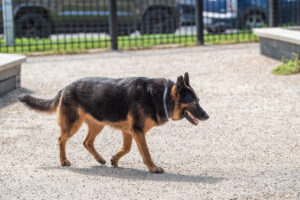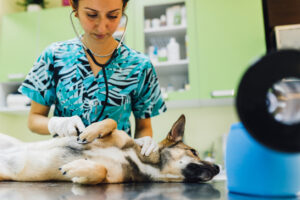Every stage of life has its rewards and challenges for pet owners dogs as well as their pets. Like their owners, pets face health problems as they advance in age. Some of these challenges include arthritis, hearing or vision loss, cognitive decline, cancer, dental disease, heart disease, kidney disease and hypothyroidism.
Arthritis is a degenerative joint disease which can be painful. While most dogs develop some arthritis as they age, large and giant breeds are at a higher risk of developing this disease. Signs of possible arthritis include difficulty going up or down stairs, jumping in and out of cars, and stiffness when trying to stand after lying down. Treatment options include medication and management strategies such as weight loss for overweight dogs.

Hearing loss is common among older dogs. Finding ways to communicate, with a dog who suffers from hearing loss, is important for their overall health. Teaching hand signals or physically walking over to your dog to let her know it is time to eat are options for communicating with a dog who experiences hearing loss.
Vision loss from cataracts, dry eye or nuclear sclerosis can occur in older dogs due to the natural aging process of the eye. If you notice a white cloudiness in your dog’s eye, this could be cataracts. Redness, discharge or eye infections may indicate dry eye. A bluish haze in a dog’s pupil could be caused by nuclear sclerosis and usually does not affect vision. Your veterinarian may recommend medications or surgery depending on the diagnosis and its severity.
As dogs age, they may experience cognitive decline. Cognitive dysfunction syndrome causes dogs to become confused, anxious or forgetful. Signs of cognitive decline are urinating or defecating in the house, wandering around without a purpose, or sleeping more often. Though there is no cure, cognitive decline may be managed with medication as well as environmental and behavioral modifications.

Older dogs have a higher incidence of cancer. Common types include lymphoma, bone cancer, soft tissue cancer, oral cancer and breast cancer. Some warning signs are significant weight loss, loss of appetite, skin lumps which grow larger in size, sores that won’t heal, or bleeding from the mouth, nose or anus. Dogs with cancer can have difficulty urinating or defecating. Their energy level decreases. Eating or swallowing may become difficult. They may develop difficulty ambulating.
Periodontal disease occurs when plaque and tartar build up over the years. If you do not brush your dog’s teeth regularly or take him for routine dental cleanings, periodontal disease is likely to occur as your dog ages. Outward signs of periodontal disease include picking up then dropping food or difficulty eating. Regular dental cleanings by your veterinarian will help prevent your dog from developing dental disease.

As dogs age, their chances of developing heart disease increase. Signs of heart disease include tiring more easily, coughing, especially at night, or difficulty breathing. If your dog’s gums or tongue have a bluish appearance, this could be a sign of severe breathing issues. Depending on the diagnosis, your veterinarian could prescribe medication or a special diet to help manage your dog’s condition.
Because kidney failure is common in older dogs, a regular geriatric exam by your veterinarian will increase the chances of catching this condition in its early stages. While kidney disease is irreversible, it may be possible to manage the condition through diet, fluid therapy, medication or supplements.
Inadequate levels of thyroid hormones can cause hypothyroidism, a condition dogs can develop as they age. Signs your dog may have this condition are skin and coat issues, unexplainable weight gain, loss of energy and less mental quickness. In order to diagnosis this disease, blood tests are necessary to measure your dog’s thyroid hormone levels. If your veterinarian confirms your dog has this condition, she will likely require prescribe daily medication.

As your dog ages, he will likely face some challenges. Though you cannot prevent common health problems from occurring, you can ensure your dog receives proper veterinary care so he is healthy, happy and comfortable throughout his wonderful life.
